Next Time You Hear "Immigrants Take Jobs," Remember This

By:
I’m sure you’ve heard it before: immigrants are stealing jobs. The chorus of “immigrants take jobs away from hard-working Americans” can be heard from sea to shining sea and throughout the purple mountains and their majesty. However, at its core the claim has no statistical weight and is nothing more than fear, racism, and bigotry disguised as economic nous.
Their line of logic is easy enough to follow: America has an unemployment problem, which means there aren’t enough jobs for the people who already live here — so immigration could only exacerbate things. It’s a sentiment that applies to both documented and undocumented migration, as adding more job seekers is incorrectly assumed to strain the market regardless legality status. However, labor force dynamics are more complicated than that. The statistics prove it. A 2011 Immigration Policy Center (IPC) study showed no statistically relevant relationship between new immigrants — either documented or undocumented — and higher unemployment.
One of the biggest misconceptions regarding immigration and the labor market is the idea that immigrant and native-born workers are competing for the same jobs. Immigrant workers and native-born workers fill complementary roles in the workforce; they’re not competing. Immigrant workers are, on average, slightly less educated than native-born workers and they specialize in different industries. Take a look at these graphs from the Brookings Institute that break down educational demographics for both foreign and native-born workers, and in which industries those workers are concentrated.
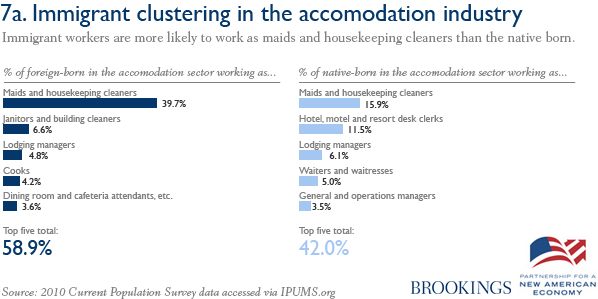 Brookings Institute/Partnership for A New American Economy - brookings.edu
Brookings Institute/Partnership for A New American Economy - brookings.edu
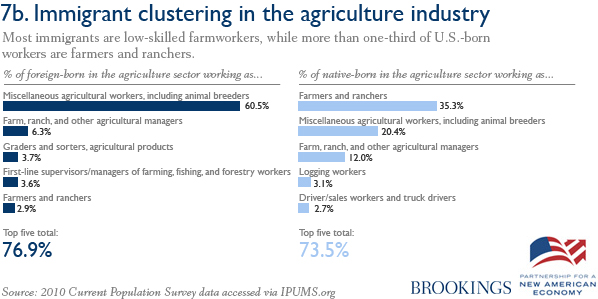 Brookings Institute/Partnership for A New American Economy - brookings.edu
Brookings Institute/Partnership for A New American Economy - brookings.edu
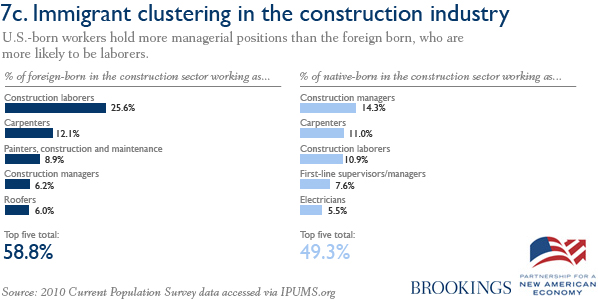 Brookings Institute/Partnership for A New American Economy - brookings.edu
Brookings Institute/Partnership for A New American Economy - brookings.edu
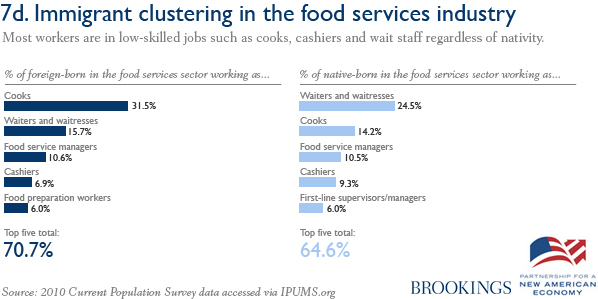 Brookings Institute/Partnership for A New American Economy - brookings.edu
Brookings Institute/Partnership for A New American Economy - brookings.edu
As an economic unit, immigrants take lower paying jobs that require less training and fewer language skills. Since 2000, the number of low-wage American workers has dropped by more than 1.8 million, as improving education and an aging population shrinks the number of native-born workers willing or able the take those jobs. There is a demand for entry level and low-skilled labor, and immigrants can provide that labor. In fact, when immigrants fill low-skill jobs, much of the workforce benefits. Between 1990 and 2004, roughly nine out of 10 native-born workers with at least a high school diploma experienced wage gains because of increased immigration.
The U.S. does have low-wage native-born workers, often living in the most poverty-stricken regions of the country. Largely made up of minorities, these workers are arguably the most vulnerable to a tightening job market. Yale University economist Gerald D. Jaynes conducted a large-scale statistical analysis measuring immigration’s effects on wages and employment of these native-born workers and, “to our surprise, no matter how we approached the data, our results showed either no effects or very modest effects for the least-educated black men.” The effects that are seen are often positive. Increased immigration leads to lower unemployment rates, lower poverty rates, and higher wages among African Americans.
It seems counter-intuitive. How does immigration’s adding of workers into a scarce labor market not result in fewer jobs for everyone? The answer lies in the fact that immigrants, both documented and undocumented come to the United States and do more than just work. Though the search for profitable employment may be the impetus to uproot a life and relocate, by joining and increasing the labor force immigrants also grow the consumer base. Every worker is also a consumer. Simply by going about their day, seeing a movie, buying a new shirt, dining out, and merely participating in society immigrants grow the demand for labor and create new jobs in the service industry.
But the service industry is not the only place that the positive effects of immigration on the job market can be felt. Until this point, we’ve talked almost exclusively about the low-skilled sector of immigrant labor, but that does not account for a growing high-skilled industry where immigrant labor is a vital resource: the tech industry. As you can see from the Brookings Institute’s findings, immigrants are clustered in high-skill industries as well.
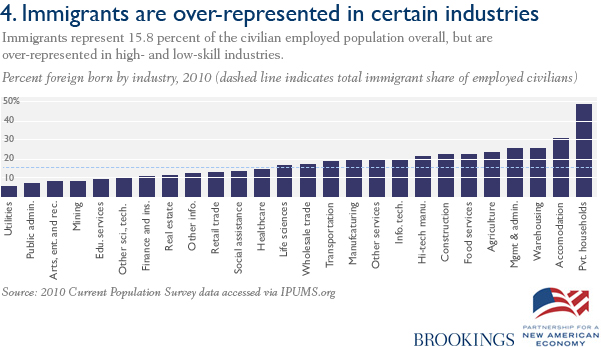 Brookings Institute/Partnership for A New American Economy - brookings.edu
Brookings Institute/Partnership for A New American Economy - brookings.edu
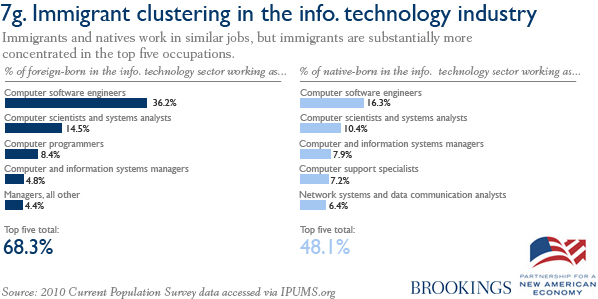 Brookings Institute/Partnership for A New American Economy - brookings.edu
Brookings Institute/Partnership for A New American Economy - brookings.edu
Immigrant workers are 30 percent more likely to start their own business than a native-born worker. A 2008 study by the Kauffman Foundation showed that between 1999 and 2005, immigrants founded 52 percent of all Silicon Valley tech companies. That accounted for the employment of 560,000 workers and generated $63 billion in sales. That is job-creation, not job-theft.
Perhaps the saddest aspect of the whole issue is that our broken immigration system actually mutes the positive impacts of increased immigration on both ends of the labor market. Low-skilled workers are often undocumented. This places them at risk of mistreatment by their employers. Undocumented workers are not protected by labor laws. They suffer hazardous work environments with no workman’s compensation safety net. The exploitation of the undocumented workforce drives down wages for all workers. If there were a better path to legal-status, some eight million undocumented laborers would be able to emerge from their shadowy existence. They could finally build a united labor movement that would drive higher wages and better working and living conditions for the entire labor force – both immigrant and native-born.
On the high-skill end of the immigrant labor spectrum, an unwelcoming immigration system is causing a brain drain in Silicon Valley. A new Kauffman study shows that after the visa restrictions of 2006’s Comprehensive Immigration Reform Act made it tougher for Silicon Valley’s immigrant entrepreneurs to get the visas they needed, the number of immigrant-founded businesses declined from 53.2% to 43.9%. We should be encouraging brilliant minds to bring their venture to the United States, not driving them away. The tech industry in Silicon Valley and the immigrant brains behind it are extremely valuable — so valuable that in 2013 Canada put up a billboard in California advising would-be immigrant entrepreneurs facing visa struggles that they would be welcomed with open arms.
![]() Minister Kenney in Silicon Valley with billboard for Start-Up Visa/Citizen and Immigration Canada - gc.ca
Minister Kenney in Silicon Valley with billboard for Start-Up Visa/Citizen and Immigration Canada - gc.ca
The old adage that immigrants take all the jobs is a clear fallacy. In fact, immigration has almost exclusively positive impacts on the labor market. Immigrants not only provide complementary labor to native-born high-skill workers, but also help better the lives of their fellow low-skill workers. Our broken immigration system is what works against our economic best interests, stymieing the positive impacts that immigrants and their labor have on the economy. It’s time to create a sensible path to legal-status for both the undocumented workers among us, would-be immigrants ready to help revitalize the economy. It’s time to stop blaming immigrants for America’s unemployment problems and start realizing that immigration is a boon to the job market, not a burden.
